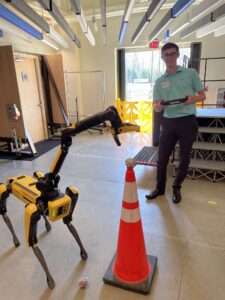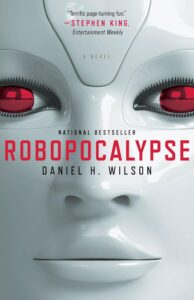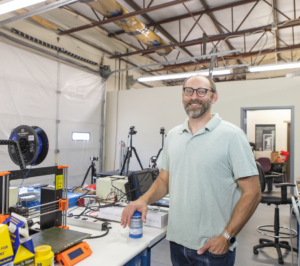Join us on Oct. 3 at 7 p.m. at 101 Archer!
All attendees will be entered into a prize raffle!
Whether you are interested in robotics from an innovative or historical standpoint, ROBOTS 101 has a topic that will interest you!

The event will take a look at the history, culture, and science of robots and how they’re changing the world, highlighting the space that robots have held in science and pop-culture since the early 20th century. Robots 101 will also help to set the stage for the upcoming world-premiere adaptation of Karel Capek’s R.U.R. by Riffraff Tulsa at 101 Archer the following week!

With such a wide-ranging overview on robots to be discussed, Oklahoma Center for the Humanities has invited UTulsa Professors Alican Camci, John Hale, Ben Peters, and Joshua Schultz along with Meagan Mulgrew, the Creative Director for Riffraff Tulsa, to present on and discuss vary topics surrounding robots. Dr. Schultz will explore how robots in the workplace might make us more human by taking on repetitive, industrial tasks. Dr. Peters will look at the history of R.U.R. (or Rossum’s Universal Robots), its Prague context, golems, puppetry and other imaginations of simulated human beings. Meagan Mulgrew will follow by explaining why and how she went about adapting R.U.R. for modern audiences. Dr. Çamcı will look at the history of musical automatons. And, Dr. Hale will explore the relation between body, mind, and reason in thinking about robots as well as the cybersecurity around robots.
If you are more interested in seeing robotics in action than learning the history behind them and how they could impact the future, don’t worry! Those in attendance will get to interact with some of the Boston Dynamics robots from TU’s lab!
In addition, all attendees at the discussion will be entered into a raffle to win two pairs of tickets to R.U.R., which will be staged at 101 Archer from Oct. 9-12, as well as copies of Robopocalypse by UTulsa alum Daniel Wilson. Magic City Books will also be on site selling sci-fi smash hits that are a staple for any bookshelf.
Robots 101 is on Oct. 3 at 7:00pm at 101 Archer Street. To stay up-to-date with OCH events, bookmark our homepage at humanities.test.utulsa.edu or follow us on social media.
About the Panelists
 Ben Peters, the Hazel Rogers Associate Professor and Chair of Media Studies, writes and teaches about media technologies for the humanities and social sciences. His first book was about the Soviet internet, and his current project on Soviet AI includes a few robots in Prague.
Ben Peters, the Hazel Rogers Associate Professor and Chair of Media Studies, writes and teaches about media technologies for the humanities and social sciences. His first book was about the Soviet internet, and his current project on Soviet AI includes a few robots in Prague.
 Meagan Mulgrew is the Board President, Executive Artistic Director, and Co-Founder of Riffraff Tulsa. She holds a Master of Arts degree in Theatre Criticism and Dramaturgy from Royal Central School of Speech and Drama, with a focus in translation and adaptation development. She will discuss her new adaptation of Karel Capek’s R.U.R. and how she made it more accessible to modern audiences.
Meagan Mulgrew is the Board President, Executive Artistic Director, and Co-Founder of Riffraff Tulsa. She holds a Master of Arts degree in Theatre Criticism and Dramaturgy from Royal Central School of Speech and Drama, with a focus in translation and adaptation development. She will discuss her new adaptation of Karel Capek’s R.U.R. and how she made it more accessible to modern audiences.
 Alican Çamcı’s output includes concert music, electronic and electroacoustic works, sound installations, and sound design for film and media art. Alican received degrees from the University of Chicago (PhD) and the Peabody Conservatory (BM-MM). Currently, he is the J. Donald Feagin Assistant Professor of Music and Film Studies and an OCH Faculty SPACE Fellow for 2024-25. He will look at the history of musical automatons.
Alican Çamcı’s output includes concert music, electronic and electroacoustic works, sound installations, and sound design for film and media art. Alican received degrees from the University of Chicago (PhD) and the Peabody Conservatory (BM-MM). Currently, he is the J. Donald Feagin Assistant Professor of Music and Film Studies and an OCH Faculty SPACE Fellow for 2024-25. He will look at the history of musical automatons.
 Joshua A. Schultz, Ph.D., is an expert in motion systems in robotics and mechatronics. His group is inspired by motion systems in anatomy and physiology and works to understand what makes these biological systems so adaptable, reliable, and resilient, and apply these same principles to the design, operation, and control of robotic systems. He will make an argument for why robots in the workplace might make us more human.
Joshua A. Schultz, Ph.D., is an expert in motion systems in robotics and mechatronics. His group is inspired by motion systems in anatomy and physiology and works to understand what makes these biological systems so adaptable, reliable, and resilient, and apply these same principles to the design, operation, and control of robotic systems. He will make an argument for why robots in the workplace might make us more human.
 Dr. John Hale is Chairperson and Professor of Computer Science and holds the Tandy Endowed Chair in Bioinformatics and Computational Biology at the University of Tulsa. His research has been funded by the US Air Force, the National Science Foundation (NSF), the Defense Advanced Research Projects Agency (DARPA), the National Security Agency (NSA), and the National Institute of Justice (NIJ). These projects include research on robotics, neuroinformatics, cyber trust, information privacy, attack modeling, secure software development, and cyber-physical system security.
Dr. John Hale is Chairperson and Professor of Computer Science and holds the Tandy Endowed Chair in Bioinformatics and Computational Biology at the University of Tulsa. His research has been funded by the US Air Force, the National Science Foundation (NSF), the Defense Advanced Research Projects Agency (DARPA), the National Security Agency (NSA), and the National Institute of Justice (NIJ). These projects include research on robotics, neuroinformatics, cyber trust, information privacy, attack modeling, secure software development, and cyber-physical system security.
